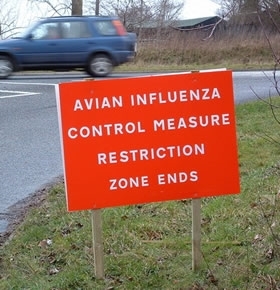A case of H5N8 bird flu in a flock of chickens and geese near Diss in south Norfolk was confirmed by the UK’s Deputy Chief Veterinary Officer on Saturday night (June 3).
A 3 km Protection Zone and a 10 km Surveillance Zone have been put in place around the infected premises to limit the risk of the disease spreading.
The flock is estimated to contain some 35 birds

A number have died and the remaining live birds at the premises are being humanely culled.
A full investigation is under way to determine the source of the infection.
Public Health England advises that the risk to public health from the virus is very low and the Food Standards Agency is clear that bird flu does not pose a food safety risk for UK consumers.
Keepers are urged to continue to be vigilant and look out for the signs of avian flu in their flocks, informing the Animal and Plant Health Agency should they suspect infection.
Department for Food, Environment and Rural Affairs (DEFRA) lifted the Prevention Zone measures on May 15.
For more information including maps of the affected area and implications for gamebird management within the Protection and Surveillance zones, visit https://www.gov.uk/government/uploads/system/uploads/attachment_data/file/617145/ai-pz-norfolk-170603.pdf
Importantly, no gamebird releasing is allowed and a licence must be obtained before moving birds into or out of the Surveillance and Protection Zones. More generally, given the nature of recent outbreaks, advice for all bird keepers, nationwide, is that allowing kept birds to mingle with wild birds, especially near to water, is unwise at this time. Further information on bird flu and gamebirds is available here.
Notes to editors
The Game & Wildlife Conservation Trust – providing research-led conservation for a thriving countryside. The GWCT is an independent wildlife conservation charity which has carried out scientific research into Britain’s game and wildlife since the 1930s. We advise farmers and landowners on improving wildlife habitats. We employ more than 60 post-doctoral scientists and other research staff with expertise in areas such as birds, insects, mammals, farming, fish and statistics. We undertake our own research as well as projects funded by contract and grant-aid from government and private bodies.
For information, contact:
Eleanor Williams
Telephone: 07592 025476
Email: press@gwct.org.uk